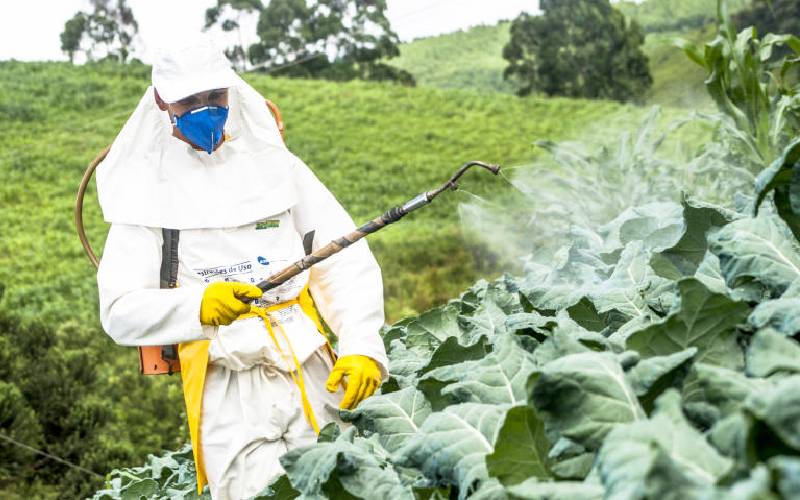
Farmer with manual pesticide sprayer on cabbage field.[Getty Images]
Kenyan exporters of fresh produce are now eyeing markets away from European Union (EU) countries ahead of the 2022 implementation of the Sustainable Use of Pesticides Policy.
The search for new markets is informed by expected losses of Sh105 billion annually if the country adopts the new policy.
Exporters are now looking for new markets in the US, China, Thailand, the Middle East and India to cushion themselves from the expected losses.
Players drawn from the Agrochemical Association of Kenya and Fresh Produce Consortium of Kenya claim if the policy is ratified, annual earnings from fresh produce will dip by 70 per cent.
The concern stems from a petition in the National Assembly by Uasin Gishu Woman Representative Gladys Boss Shollei that seeks to ban the use of some pesticides locally, which are outlawed in other countries in the production of fresh produce. The petition wants the National Assembly to ban all products in the Kenyan market classified as carcinogenic, mutagenic, endocrine disruptors, neurotoxic and all others that show the effect on reproduction toxicity.
The petitioner also recommends an amendment to the Pest Control Products Act to include a list of pesticides that have been withdrawn from the market based on severe health risks posed.
But Fresh Produce Consortium of Kenya has argued that adoption of these recommendations means Kenya is at liberty to adopt the EU Policy on Sustainable Use of Pesticides, which will have a negative impact on farmers’ earnings.
The consortium boss, Okisegere Ojepata, said Kenya should stick to the guidelines, standards and code of practice on food safety and security as stipulated by the World Health Organisation and Food and Agriculture Organisation.
“EU gives us our largest market, but this does not mean we can be dictated upon,” said Mr Ojepat.
He said banning the pesticides in the country will reduce output by half, which will make the country a net importer of food, considering Kenya’s agricultural sector barely operates at 60 per cent of its potential.
The consortium boss insisted that if these changes have to be made, then it should be on a negotiation basis to find alternatives. He said so far, there has been no death or hazardous health effect reported from the use of pesticides currently in the market.
Kenya’s horticulture sector earned the country Sh148 billion last year.
“There are certain pests in Africa that cannot survive in EU because their temperatures go to as low as -4 degrees, while here it can be as high as 38 degrees. We are at a crossroads, but we will not allow certain things to happen,” said Ojepat.
The petition, whose report has been compiled by National Assembly Health Committee, acknowledges the concerns raised by industry players that a blanket ban of pesticides without due consideration of risk assessment will not help, especially in tropical countries such as Kenya that experience an invasion of pests and diseases throughout the year.
The committee chaired by Murang’a Women Representative Sabina Chege lists reduced farmer income caused by insufficient production, expensive food and threat on food security as some of the impacts of the blanket ban. There were 24 products in the Kenyan market classified as carcinogenic, while 24 others were classified as mutagenic, endocrine disrupter (35), neurotoxic (140) and 262 others showed apparent effects on reproduction toxicity.
“These products are banned in Europe, the United Kingdom and the United States of America,” reads the report on the petition.
Agrochemical Association of Kenya Chief Executive Eric Kimungunyi said the role of agriculture in supporting the Gross Domestic Product of the country cannot be gainsaid.
 The Standard Group Plc is a multi-media organization with investments in media platforms spanning newspaper print
operations, television, radio broadcasting, digital and online services. The Standard Group is recognized as a
leading multi-media house in Kenya with a key influence in matters of national and international interest.
The Standard Group Plc is a multi-media organization with investments in media platforms spanning newspaper print
operations, television, radio broadcasting, digital and online services. The Standard Group is recognized as a
leading multi-media house in Kenya with a key influence in matters of national and international interest.











